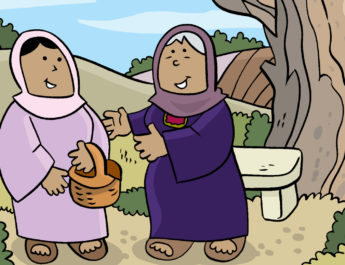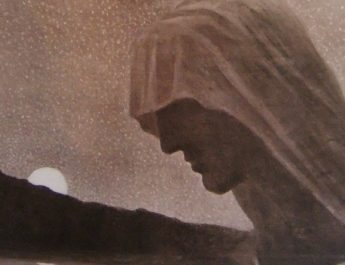Exodus 3:1-15
Ordinary A40
BibleHub
1 MosesA was keepingB the flockC of his father-in-lawD Jethro,E the priest of Midian;F
Notes on verse 1a
A “Moses” = mosheh. From mashah (to pull out in a literal or figurative sense, to draw out) OR from Egyptian mes or mesu (child, son i.e. child of…). This is Moses – the one drawn out from the water, which is to say, rescued. If derived from the Egyptian, his name would share a root with Rameses and Thutmose.
B “keeping” = ra’ah. This is to tend a flock, pasture, or graze. It can mean to rule or to associate with someone. Figuratively, it can be ruler or teacher.
C “flock” = tson. This is a flock of sheep and goats.
D “father-in-law” = chathan. Perhaps from chathan (bridegroom, son-in-law; someone who is related through marriage; figuratively can be a child who is circumcised). This is to intermarry, make an alliance through marriage, father-in-law, son-in-law, give one’s daughter in marriage.
E “Jethro” = yithro. 10x in OT. From yether (a remainder or excess; abundant, superiority; a cord a free-hanging rope); from yathar (to jut over, remain behind, preserve, to excel). This is Jethro, or Yithro, meaning excellent or remnant.
F “Midian” = midyan. From the same as madon (strife, contention, brawling); from din (to judge, defend, dispute, govern, strive). This is Midian or a Midianite. It means strife or place of judgment.
he ledG his flock beyond the wilderness,H and came to Horeb,I the mountain of God.J
Notes on verse 1b
G “led” = nahag. This is to drive as in driving flocks, but also driving in animal or vehicle like a chariot. It can mean to carry away, lead, drive away, proceed, or guide. It can also relate to behavior and what one is accustomed to.
H “wilderness” = midbar. From dabar (to speak, command, declare). This is mouth or speech. It can also be desert or wilderness. Additionally, it can be used for a pasture to which one drives cattle.
I “Horeb” = choreb. 17x in OT. From chareb (to devastate, desolate, or be waste). Horeb means waste or desolate.
J “God” = Elohim.
2 There the angelK of the LordL appeared to him in a flameM of fire out of a bush;N
Notes on verse 2a
K “angel” = malak. This is a messenger, an angel, or a deputy of some kind. Can be used for human messengers literally or for prophets, priests, or teachers as messengers of God. Also used for supernatural messengers i.e. angels.
L “Lord” = YHVH. From havah (to be, become) or hayah (to come to pass, become, be). This is the name of the God of Israel, the self-existent and eternal one, the tetragrammaton. This pronunciation has been lost to time so “Lord” is generally used in its place.
M “flame” = labbah. 1x in OT. From the same as lehabah (flame, blazing, head of a spear); from lahab (flame, flashing, glittering; properly, to gleam and so it could figuratively be a blade that is polished, flashing or the point on a weapon). This is flame.
N “bush” = seneh. 6x in OT – all in this story or in reference to this story in Deuteronomy 33:16. This is some kind of thorny bush like a bramble or blackberry bush. It may come from a root that means to prick.
he looked,O and the bush was blazing,P yet it was not consumed.Q
Notes on verse 2b
O {untranslated} = hinneh. From hen (lo! Behold! If, though; an expression of surprise). This is to draw attention, show suddenness or surprise, or to emphasize the importance of the coming statement. See! Lo! Behold!
P “blazing” = ba’ar. This is to burn, consume, heat, remove. It can also be to consume by a fire or through eating, being brutish or wasting
Q “consumed” = akal. This is to eat, devour, burn up, or otherwise consume. It can be eating in a literal or figurative sense.
3 Then Moses said, “I must turn asideR, S and look at this greatT sight,U and see why the bush is not burned up.”V
Notes on verse 3
R “turn aside” = sur. This is to turn aside in a literal or figurative sense – to depart, decline, rebel, remove, or withdraw.
S {untranslated} = na. This particle is used for requests or for urging. It can be we pray, now, I ask you, oh. This is the same “na” in “hosanna.”
T “great” = gadol. From gadal (to grow up, become great, become wealthy – to advance. The root meaning may be to twist in the sense of the process of growing). This is great, high, bigger, noble, old, marvelous. It can also refer to someone who is powerful or distinguished.
U “sight” = mareh. Related to “appeared” in v2. From raah (to see, show, stare, think, view; to see in a literal or figurative sense). This is sight, appearance, or vision. It can be a view, seeing itself, that which is seen, something real, or a vision one sees
V “burned up” = ba’ar. Same as “blazing” in v2. See note P above.
4 When the Lord saw that he had turned aside to see, God calledW to him out of the bush, “Moses, Moses!”
And he said, “Here I am.”X
Notes on verse 4
W “called” = qara. This is to call or call out – to call someone by name. Also used more broadly for calling forth.
X “here I am” = hinneh. Same as {untranslated} in v2. See note O above.
5 Then he said, “Come no closer!Y RemoveZ the sandalsAA from your feet,BB for the placeCC on which you are standingDD is holyEE ground.”
Notes on verse 5
Y “come…closer” = qarab. This is to come near, offer, make ready, approach, take.
Z “remove” = nashal. 7x in OT. To pluck off, clear, remove, eject, or drop.
AA “sandals” = naal. From naal (properly to secure with a bar or cord; to lock, bolt, enclose; to secure with a cord i.e. to put on a sandal). This is the tongue of a sandal and, by extension, a sandal or shoe itself. Figuratively, this can refer to occupancy, unwillingness to marry, or something without value.
BB “feet” = regel. This is foot, endurance, or journey. It is a foot as the means of walking and so it implies a step or a greater journey. It can be used euphemistically for private parts.
CC “place” = maqom. From qum(to arise, stand, accomplish, establish, abide; rising against, getting up after being sick or asleep, arising from one state to another, becoming powerful, or rising for action; standing in a figurative sense). This is a standing, which is to say a spot or space a place. It can also refer to a locality or a physical/mental condition. HaMaqom is also a Jewish name for God – the place, i.e. the Omnipresent One.
DD “standing” = amad. This is to stand up in a literal or figurative sense. So it can be establish, continue, endure, take a stand, act, be a servant, stand still, remain, stand against an enemy.
EE “holy” = qodesh. This is set apart and so sacred. God is different from us and so God is holy/set apart. Things we dedicate to God’s service are set apart for God and so they, too, are holy, etc.
6 He said further, “I am the God of your father, the God of Abraham,FF the God of Isaac,GG and the God of Jacob.”HH And Moses hidII his face,JJ for he was afraidKK to lookLL at God.
Notes on verse 6
FF “Abraham” = Abraham. Related to “father” in v6. From the same as Abiram (exalted father, a high father – lofty) {from ab (father literal or figurative) + rum (rise, bring up, being high, extol, exalt, haughty; to raise in a literal or figurative sense)}. This is Abraham, father of many nations or father of a multitude.
GG “Isaac” = yitschaq. From tsachaq (to laugh, mock, play, make sport; this is laughing out loud whether in joy or in a scornful way). This is Isaac, meaning “he laughs.”
HH “Jacob” = yaaqob. From the same as aqeb (heel, hind part, hoof, rear guard of an army, one who lies in wait, usurper). This is Isaac’s son and his descendants. The name means heel-catcher or supplanter.
II “hid” = sathar. This is hide, conceal, or be absent. It is hiding because something is covered – used in a literal or figurative sense.
JJ “face” = paneh. From panah (to turn, face, appear). This is face in a literal or figurative sense. It could be face, presence, anger, respect. It can also be used of God to indicate divine favor or presence.
KK “was afraid” = yare. This is to fear, be afraid, dreadful. It can also refer to fearful reverence – to fear in a moral sense is to say to revere, respect.
LL “look” = nabat. This is to behold, look at intently, consider, or scan. It can mean to have respect or regard someone favorably.
7 Then the Lord said, “I have observedMM the miseryNN of my peopleOO who are in Egypt;PP
Notes on verse 7a
MM “observed” = raah + raah. Related to “sight” in v3. See note U above. The word is repeated twice – the first time as an Infinitive Absolute. The Infinitive Absolute serves to emphasize the sentiment of the word. It is rather like Foghorn Leghorn’s speech pattern, “I said, I said.”
NN “misery” = oniy. From anah (to be bowed down; humility or being browbeaten, oppressed, afflicted, or depressed; literal or figurative – depressed in mood or circumstance). This is misery, poverty, or affliction.
OO “people” = am. From amam (to darken, hide, associate; creating shadows by huddling together). This is people or nation. It can be used specifically for a tribe, collectively of troops or armies, or figuratively to refer to a flock of animals.
PP “Egypt” = mitsrayim. Perhaps from matsor (besieged or fortified place, bulwark, entrenchment; something hemmed in; a siege or distress or fastness); from tsur (to confine, besiege, to cramp). This is Egypt.
I have heardQQ their cryRR on account ofSS their taskmasters.TT Indeed, I knowUU their sufferings,VV
Notes on verse 7b
QQ “heard” = shama. This is to hear, call, consent, or consider. It implies listening intelligently, giving attention, and, because of these two factors, obedience and action are often implied.
RR “cry” = tseaqah. From tsaaq (to cry out or call together, to shriek; by implication, calling for an assembly). This is a cry for help, shriek or outcry.
SS “on account of” = paneh. Same as “face” in v6. See note JJ above.
TT “taskmasters” = nagas. This is driving an animal, worker, debtor, or an army. By implication, it can mean to tax, harass, distress, oppress, or tyrannize. This word can be used for taskmaster or overseer.
UU “know” = yada. This is to know, acknowledge, advise, answer, be aware, be acquainted with. Properly, this is to figure something out by seeing. It includes ideas of observation, recognition, and care about something. It can be used causatively for instruction, designation, and punishment.
VV “sufferings” = makob. 16x in OT. From kaab (being in pain, be sad, grieve, spoil, mar). This is pain, sorrow, or suffering. It can be anguish or affliction.
8 and I have come down to deliverWW them fromXX the Egyptians,YY and to bring them up out of that land to a goodZZ and broadAAA land,
Notes on verse 8a
WW “deliver” = natsal. This is to snatch someone or something away in a good sense – as rescue, defend, or deliver – or in a bad sense – as strip or plunder.
XX “from” = yad. Literally “out of the hand of.” This is hand, ability, power. Hand in a literal sense, but also what one can do or the means by which one does it.
YY “Egyptians” = mitsri. Related to “Egypt” in v7. From the same as mitsrayim (see note PP above). This is Egyptian.
ZZ “good” = tob. From tob (to be pleasing, to be good). This is good, beautiful, pleasant, agreeable, bountiful, at ease. This word is used for goodness as a concept, a good thing, a good person. This can refer to prosperity and welfare as well as joy, kindness, sweetness, and graciousness. So, this is ethically good, but also enjoyably good.
AAA “broad” = rachab. From rachab (to grow wide or enlarge in a literal or figurative sense; extend, relieve, rejoice, or speak boldly). This is wide, extensive, spacious, or vast. It is roomy in a literal or figurative sense. It can also mean liberty or proud.
a land flowingBBB with milkCCC and honey,DDD to the countryEEE of the Canaanites,FFF
Notes on verse 8b
BBB “flowing” = zub. This is to flow or gush. It is to flow like water or overflow. It can also be discharge, pine, waste away, or have a sexual flow.
CCC “milk” = chalab. Perhaps from the same as cheleb (fat, finest, marrow; fat in a literal or figurative sense; the richest or best part). This is milk or cheese or suckling.
DDD “honey” = debash. Root may mean being gummy. This is honey or honeycomb because it is so sticky. It can also refer to syrup.
EEE “country” = maqom. Same as “place” in v5. See note CC above.
FFF “Canaanites” = knaaniy. From Kanaan (Canaan, his descendants, and the land where they settled; perhaps meaning lowlands, describing their land or subjugated in reference to being conquered by Egypt); from kana (to be humble, subdue; properly, bend the knee). This is Cananite, which in some instances would imply a peddler or sometimes used in place of Ishmaelite. See https://en.wikipedia.org/wiki/Canaan
the Hittites,GGG the Amorites,HHH the Perizzites,III the Hivites,JJJ and the Jebusites.KKK
Notes on verse 8c
GGG “Hittites” = chitti. From cheth (Heth or Cheth; one of Canaan’s sons from whom perhaps the Hittites descend) OR from hatat (terror, lacking strength or courage); perhaps from hata (to seize; often used of coals from a fire). This is Hittite – perhaps meaning terrors or terrible. See https://www.abarim-publications.com/Meaning/Hittite.html#.XyMgpp5KhPY
HHH “Amorites” = emori. From amar (to speak, say, answer, command, promise, report). This is Amorite or Emori, perhaps meaning talkers.
III “Perizzites” = perizzi. Perhaps from perazi (rural area, unwalled land); from the same as perazah (rural, village without walls, open country); from the same as paraz (root may mean to separate; perhaps warriors, chieftan, or throng). This is Perizzite, perhaps meaning rural or wild one.
JJJ “Hivites” = chivvi. Probably from the same as chavyah (life-giving, which implies the place where one lives like a village or place where one camps); probably from the same as Chavvah (Eve, life-giver); from chavah (show, tell, live, declare). This is Hivite, perhaps meaning villagers or tent villagers.
KKK “Jebusites” = yebusi. From yebus (threshing place; one of the former names of Jerusalem); from bus (to trample down, tread in a literal or figurative sense; to loathe, pollute, squirm). This is Jebusite, meaning treaders or threshers.
9 LLLThe cry of the IsraelitesMMM has now come to me; I have also seen how the Egyptians oppress them.NNN 10 So come,OOO I will send you to PharaohPPP to bring my people, the Israelites, out of Egypt.”
Notes on verses 9-10
LLL {untranslated} = hinneh. Same as {untranslated} in v. See note above.
MMM “Israelites” = ben + yisrael. Literally “sons of Israel.” Yisrael is from From sarah (to persist, exert oneself, contend, persevere, wrestle, prevail) + el (God or god). This is God strives or one who strives with God; new name for Jacob and for his offspring. This refers to the people and to the land.
NNN “how the Egyptians oppress them” = lachats + asher + mitsri + lachats + et. Literally “the oppression with which Egypt oppressed them.” Lachats is 12x in OT. From lachats (to press, squeeze, oppress, afflict; figurative for distress). This is oppression or distress. Lachats is 19x in OT. Related to “oppression” in v9. See note NNN above.
OOO “come” = halak. This is go, come, walk. It is walk literally and figuratively and includes people and animals. It can be used figuratively for one’s moral life – how we walk according to God’s way or against it. It can also refer to the walk of life as in the course one’s life takes, the choices we make, etc.
PPP “Pharaoh” = paroh. From Egyptian pr (palace, pharaoh; literally house + great). This is Pharaoh, a title for Egyptian kings. See https://en.wiktionary.org/wiki/pharaoh
11 But Moses said to God, “Who am I that I should go to Pharaoh, and bring the Israelites out of Egypt?”
12 He said, “I will be with you; and this shall be the signQQQ for you that it is I who sent you: when you have brought the people out of Egypt, you shall worshipRRR God on this mountain.”
Notes on verses 11-12
QQQ “sign” = oth. From avah (to mark, sign, point out); OR from uth (to agree). This is a sign in a literal or figurative sense. It could be a flag or monument. It could be evidence or a mark. It could also be an omen or a miracle.
RRR “worship” = abad. This is to work, serve, or compel. It can describe any kind of work or service (including religious devotion). Also, till or cultivate. Used causatively, it can mean to enslave or keep in bondage.
13 But Moses said to God, “IfSSS I come to the Israelites and say to them, ‘The God of your ancestorsTTT has sent me to you,’ and they ask me, ‘What is his name?’UUU what shall I say to them?”
14 God said to Moses, “I am who I am.” He said further, “Thus you shall say to the Israelites, ‘I am has sent me to you.’” 15 God also said to Moses, “Thus you shall say to the Israelites, ‘The Lord, the God of your ancestors, the God of Abraham, the God of Isaac, and the God of Jacob, has sent me to you’:
This is my name forever,VVV
and this my titleWWW for all generations.XXX
Notes on verses 13-15
SSS “if” = hinneh. Same as {untranslated} in v2. See note O above.
TTT “ancestors” = ab. Literally “fathers.”
UUU “name” = shem. May be from sum (to put, place, set). This is name, fame, renown. A name was thought to indicate something essential about a person – something about their individuality. So, this word can also mean honor, authority, or character.
VVV “forever” = olam. This is a long scope of time whether in the past (antiquity, ancient time) or in the future (eternal, everlasting).
WWW “title” = zeker. From zakar (to remember, to mark something so that it can be recalled, to be mindful of, to mention). This is remembrance, renown, memento, recollection, or commemoration.
XXX “all generations” = dor + dor. Literally “of generation generation.” From dur (to move in a circle, which implies living somewhere or remaining there; it can also be the sense of piling or heaping up). This is a revolution of time, which is to say, an age or generation. It can also be a dwelling or one’s posterity.
Image credit: “Burning Bush” by earsaregood, 2009.




